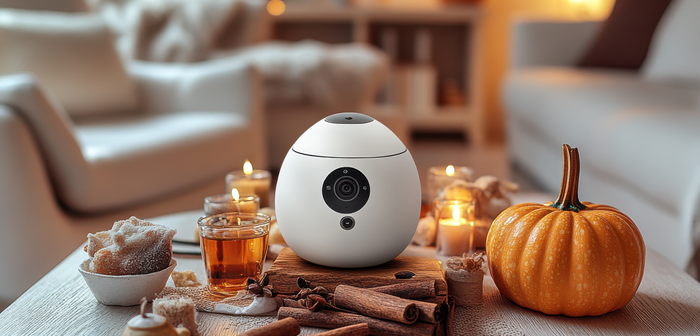Remote monitoring has become vital for enhancing security and staying connected to your home or business from virtually anywhere.
With the advancements in technology, using free IP camera software has become an affordable and practical solution for monitoring spaces remotely.
This guide explores how to effectively set up and use free IP camera software for remote monitoring so that your property is always secure and under your watchful eye.
Introduction to Free IP Camera Software
IP cameras, or Internet Protocol cameras, are versatile devices that allow video footage to be streamed and accessed over the internet.
These cameras are compatible with various free software options, enabling users to monitor spaces in real-time without breaking the bank. Free PC security camera software is an excellent way to get started, offering robust features such as livestreaming, motion detection, and video storage without hefty price tags.
Choosing the right IP camera software can transform a simple camera setup into a sophisticated monitoring system. Whether you’re monitoring your home while away on vacation or keeping an eye on your business premises, the right software bridges the gap between affordability and functionality.
Using Free IP Camera Software for Remote Monitoring
Now let’s take a look at some steps that will help you use your free IP camera software efficiently.
1. Select Compatible Software
Not all IP camera software works seamlessly with every camera model. Start by identifying free software compatible with your IP camera.
Look for features like livestreaming, motion alerts, and recording capabilities. Popular options often come with user-friendly interfaces and comprehensive support for various camera brands.
When evaluating software, ensure it supports remote access via mobile devices or desktops. This flexibility is crucial for real-time monitoring.
2. Install and Configure the Software
Once you’ve chosen the software, download it from the developer’s official site to avoid malicious versions. Install the software on a reliable PC or server that will act as the central hub for your monitoring setup.
During installation, the software will guide you through the configuration process. You’ll typically need to input the IP address of your camera, along with login credentials. This step connects your camera to the software, allowing it to receive and manage the video feed.
3. Set Up Your IP Camera
Position your IP camera in a location that provides optimal coverage. It should be within a strong Wi-Fi range or connected via Ethernet for consistent performance. Proper placement is critical for capturing clear and comprehensive footage.
Adjust the camera’s settings for resolution, field of view, and motion detection sensitivity. Many cameras let you customize these parameters through their companion apps or directly through the free PC security camera software.
4. Establish Remote Access
If you want to monitor your space remotely, the software should be configured for remote access. Most free IP camera software allows you to connect through a web browser or mobile app. You’ll need to enable port forwarding on your router and secure it with strong credentials to prevent unauthorized access.
For enhanced convenience, look for software that supports cloud-based monitoring. This eliminates the need for extensive setup and provides a secure way to view live streams from anywhere.
5. Optimize Motion Detection and Alerts
Motion detection is a standout feature in most IP camera setups. Configure your software to send alerts when movement is detected. This way, you’re immediately notified of any unusual activity, saving you from constantly monitoring the feed.
Many free PC security camera software options let you fine-tune motion detection zones, minimizing false alarms caused by pets or background movement.
6. Record and Store Footage
Recording capabilities are invaluable for reviewing incidents or maintaining a log of activities. Free IP camera software often supports local storage on your PC or external drives. Check if the software allows you to schedule recordings or only record when motion is detected to conserve storage space.
For added convenience, some software integrates with cloud services, enabling secure off-site storage. Evaluate your storage needs and choose the option that aligns with your requirements.
7. Ensure Security and Privacy
Security should be a top priority when setting up a remote monitoring system. Change the default passwords for both your IP camera and software to strong, unique combinations. Enable encryption if the software supports it so that your video streams remain private.
Regularly update the software and camera firmware to protect against vulnerabilities. Staying proactive about security measures is essential in safeguarding your monitoring system.
8. Test the Setup
Before relying on your system, conduct thorough tests to see if everything works as intended. Check the camera’s field of view, test remote access from different devices, and verify motion alerts are functioning correctly. Adjust settings as needed to improve performance.
Regular testing and maintenance will keep your setup reliable over time.
9. Explore Advanced Features
Even free PC security camera software often comes with advanced features like two-way audio, night vision compatibility, and integration with smart home devices.
Explore these features to maximize the utility of your monitoring system. For instance, integrating with a smart assistant allows you to control the camera via voice commands, adding a layer of convenience.
Conclusion
Using free IP camera software for remote monitoring is a cost-effective way to secure your property and maintain peace of mind.
With proper setup and optimization, these tools can rival more expensive professional systems. By selecting compatible software, configuring it correctly, and prioritizing security, you can create a reliable monitoring solution that keeps you connected to your space anytime, anywhere.





It was interesting to use free IP camera software for remote monitoring, especially for college students who are looking to improve their security on a budget. As a student, you may be living in shared housing or off-campus apartments, and having a simple, affordable way to monitor your space can provide peace of mind. Setting up an IP camera with free software offers flexibility, allowing you to keep an eye on your belongings, even when you’re in class or out with friends. I always use extra services such as described in paperdon review no matter for study or security. The guide’s step-by-step instructions on installation, remote access, and motion detection are helpful for tech beginners, making it easy to create a reliable security system. It also reminds me that when setting up technology, whether for security or productivity, it’s crucial to prioritize privacy and ensure your devices are secure. Overall, this is a great solution for college students looking to improve their security without breaking the bank.
The article provides a useful overview of how free IP camera software can enhance remote monitoring. It’s great for beginners, with clear steps and tips. For added insights, integrating AI pose detection could improve security by identifying suspicious activities, elevating the software’s functionality for advanced users.
casino software solution offers next-generation software that will help you create a unique gambling business in the near future, so that everyone can spend time in online games. A wide selection of slots, table games and live casino allows you to meet the needs of the most demanding customers. Easy integration, multi-platform support and reliable security will make your business effective and profitable.
Whether you’re a tactical professional, competitive shooter, or firearm enthusiast, our triggers deliver the performance you need to excel.
https://legendarytriggers.com
Thanks
Remote monitoring software is essential for businesses to track and manage devices or systems from any location. Key steps in setting up this software include selecting the right platform, ensuring secure data transfer, configuring alerts, and regularly updating the system for optimal performance. Additionally, choosing a user-friendly interface and reliable technical support is crucial. For more insights, visit https://ssstwitter.com to explore the latest trends and tools in remote monitoring.
Free IP camera software offers an efficient way to monitor spaces remotely, whether for home security or business surveillance. These tools allow users to access live feeds, record footage, and receive alerts from anywhere with an internet connection. Many solutions integrate seamlessly with a digital signage cloud server enabling businesses to display security feeds on multiple screens for better monitoring. With features like motion detection and cloud storage, free IP camera software provides cost-effective surveillance without expensive hardware. Choosing the right software ensures enhanced security, real-time access, and a flexible monitoring solution for both personal and professional needs.
In today’s digital age, free IP camera software offers an affordable solution for remote monitoring, ensuring security and peace of mind. These tools allow users to monitor homes, offices, or properties in real-time from anywhere. Advanced features like motion detection and cloud storage enhance functionality. Interestingly, some software can even integrate with other apps to track texts without access to the phone providing a comprehensive security solution. Whether for personal or professional use, free IP camera software is a versatile and cost-effective way to stay connected and safeguard your space. Always ensure the software is from a trusted source to avoid security.
What to Know About Psychometric Tests
A quick guide on how psychometric tests reveal personality traits and skills for better hiring.
https://www.atoallinks.com/2024/heres-what-you-need-to-know-about-a-psychometric-test/